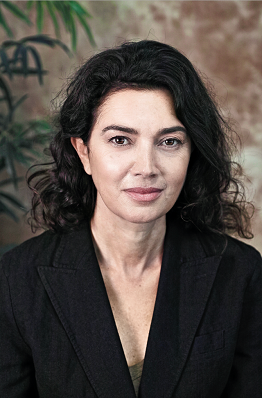
Marina Lévy
Oceanographer and climatologist
If we don't understand how the ocean works, we can't grasp the extent to which we can disrupt it.
Marina Lévy is an accomplished research director at the CNRS's Laboratory of Oceanography and Climate: Experimentation and Numerical Approaches (LOCEAN), which is attached to Sorbonne University, and has devoted her career to exploring and understanding the complex interactions between the ocean, climate and biodiversity.
“I've always loved science, and that's what naturally steered me towards the prep classes I chose when I left high school”, recalls Marina Lévy. After graduating from the École Polytechnique, the researcher embarked on an atypical career path. Unable to confine herself to one discipline, she gradually discovered her vocation during an initial internship in geophysics, followed by a second in oceanography. “What attracted me to the study of the ocean was its interdisciplinary aspect: understanding the workings of this immense machine requires knowledge of physics, chemistry and biology, as well as a good grounding in mathematics."
In the early 1990s, with the first IPCC reports highlighting the crucial role of the ocean in climate regulation, Marina Lévy decided to devote herself to this issue through the study of marine biogeochemistry. She began a thesis at Sorbonne University (then Paris VI), which led to a post-doctorate at Columbia University in the United States
Encounters with space and the ocean
Marina Lévy then joined the CNRS and became involved in international research projects. “I've worked with teams in Japan, MIT Boston, India and even the United Arab Emirates. Each project has allowed me to explore new facets and deepen my understanding of the ocean.”
Lévy's involvement with the Centre national d’études spatiales (CNES) marks another key stage in her professional life. As head of the TOSCA committee group, dedicated to space oceanography, she helped improve the use of satellites to better understand ocean dynamics. “The first expertise I acquired was in modeling: I worked on ocean turbulence by pushing the capabilities of existing numerical models, to bring out the small spatial scales in currents that are essential to marine life and the structures of its biodiversity. Space then opened up new perspectives for me."
The use of cutting-edge technologies, notably the Earth Simulator supercomputer in Japan, put her at the forefront of world research and earned her the CNRS Bronze Medal. “We were among the first to use very high-resolution models requiring colossal computing resources. This work laid the foundation for the research we are still carrying out today on ocean biogeochemical cycles, biodiversity and the impact of climate change. It's been a particularly exciting road to get to this point, involving the national and international community, building an interdisciplinary research team and welcoming new skills."
A scientific voice on the international stage
Marina Lévy's attachment to LOCEAN, the oceanography laboratory of the Institut Pierre Simon Laplace pour le climat et l'environnement, which is affiliated to Sorbonne University, has led her to become involved in scientific cooperation with a number of “southern” countries such as Senegal, India, Peru, South Africa and Morocco.
In 2016, she accepted the position of Deputy Director of IRD's Ocean, Climate and Biodiversity Department, a position she held for eight years. In this role, she promoted the transdisciplinary approach spearheaded by the institute, involving a social science dimension that is essential to meeting the challenges of sustainable development.
Since 2024, Marina Lévy has held the position of Ocean Advisor to the IRD President. Her role there is to represent the organization at international events, such as the United Nations Ocean Conference to be held in Nice from June 9 to 13.
At the same time, she is pursuing her research activities. “I'm currently working on the impacts of climate change on biogeochemical cycles in the ocean, particularly deoxygenation, oxygen loss in marine waters and changes in the carbon cycle. These phenomena have major consequences for marine ecosystems and the services they provide to mankind.”
Passing on knowledge and inspiring others
Marina Lévy's commitment goes beyond pure research. She is committed to passing on her knowledge to the younger generation of scientists. “I work with several doctoral and post-doctoral candidates. What motivates me is to give them the keys to pursue this demanding but exciting path.
This desire to pass on knowledge also extends to the general public. Marina Lévy is convinced that understanding how the ocean works is crucial to protecting our planet. “We need to understand the world around us in an almost philosophical way. The ocean is a pillar of our environment, playing an essential role in regulating the climate and maintaining biodiversity. If we don't understand how it works, we can't grasp the extent to which we can disrupt it.”
Pauline Ponchaux
